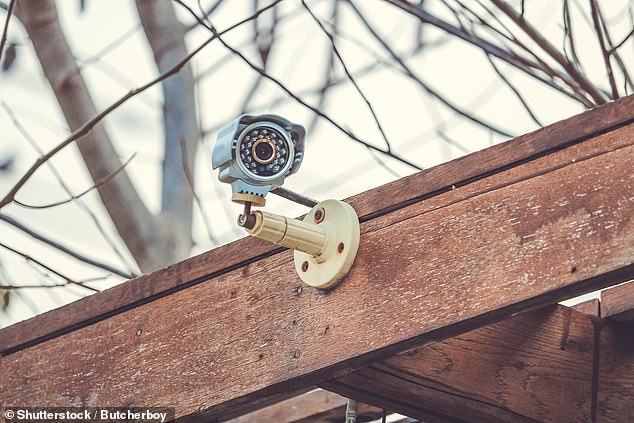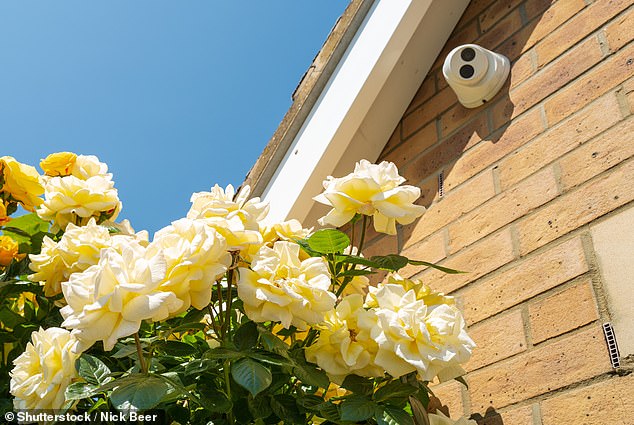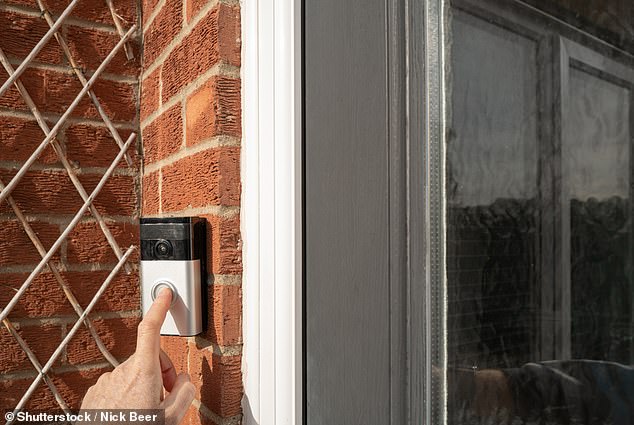Our neighbour’s CCTV is recording us: Can we make them take it down?
Our neighbor recently decided to install a smart doorbell next to his front door.
We live in a semi-detached house and his front door is right next to ours. It means that every time we leave and enter our house, he can watch or listen to us.
He has also installed cameras in his backyard that essentially look like CCTV cameras – I assume this wards off would-be burglars.

Invasion of privacy? The neighbor has installed a CCTV camera in his backyard and our reader thinks it has a view of his own house
It’s quite clear that both cameras are high enough to see into our garden and possibly even into our kitchen, which overlooks the garden.
We believe that these cameras endanger our privacy.
Do we have the right to complain and can we legally force him to remove or move the cameras if push comes to shove?
Ed Magnus from This is Money answers: It is often impossible to prevent neighbors from being at least partially overlooked in an urban environment, but CCTV cameras can give people the feeling that they are constantly being watched.
Chances are your neighbor won’t pay any attention to the recordings unless something goes wrong, but it’s easy to get paranoid when a camera is pointed your way.
CCTV cameras are often used as a deterrent against would-be burglars, as you may have assumed is the case here.
The reality is that your neighbor has the right to install CCTV cameras and smart doorbells on his property. They should try to avoid overlooking yours, but this is not always possible.
It would be worth discussing the matter with your neighbor. Be polite rather than confrontational and point out that this makes you feel uncomfortable.
You can then investigate if there are alternative places where the cameras can be placed that are less intrusive.

Surveillance: No one wants to feel like they are being filmed or recorded within the confines of their own home and garden
The Information Commissioner’s Office (ICO) monitors and enforces data protection laws. It says: ‘The use of recording devices, such as CCTV or smart doorbells, to capture video or audio recordings outside the user’s property boundary does not breach data protection law.
‘People should try to point their CCTV cameras away from their neighbours’ homes and gardens, shared spaces or public streets. But this is not always possible.
‘If people are making images and audio recordings outside their property boundaries, they should consider how intrusive this activity is.
‘They should consider whether they can point their cameras elsewhere or, if possible, apply filters or privacy blocks.
‘In these circumstances, data protection law also requires them to follow certain rules – although these can be difficult to enforce.’

No blockage: the neighbor has a smart doorbell installed on his front door, which means that every time our reader leaves and enters his house, he or she might be watching or listening in
The ICO does have advice for those who don’t like being recorded by a neighbour’s CCTV. It suggests the next steps.
Contact your neighbor first. If you are worried about having a personal conversation, you can try writing a letter.
Second, ask why they use CCTV. People usually install CCTV cameras and smart doorbells to monitor and protect personal belongings.
They can make the user and their family feel safe. Understanding why they are recording can give you peace of mind.
You may even reach an agreement where you share the system. You can then both benefit from the camera’s safety features.
Third, explain your concerns. The CCTV user may not understand why you are concerned about being recorded. If you explain your reasons, they may change the position of the cameras.
Finally, ask to see what they record. The images captured by the camera may not be as intrusive as you think. Seeing a preview of what the camera is recording may help you feel less concerned.
We have spoken Olivia Egdell pagepartner and head of the real estate department at Joseph A Jones & Co lawyers, for her advice on this.
She says: The use of security cameras is regulated by the Data Protection Act 2018.
Photos or moving images of people qualify as ‘personal data’ within the meaning of the law.
The use of cameras for limited domestic purposes is exempt from the law, provided the field of view is limited to the householder’s own property. I note that this is not the case here and that this is the reason for your complaint.
It is fundamental to consider the privacy of others when setting up a CCTV system and ensure that neighbors are aware of the system being installed.

Olivia Egdell-Page says a neighbour’s use of CCTV cameras can, depending on the circumstances, be challenged under the Protection from Harassment Act 1997
A neighbour’s use of CCTV cameras may, depending on the circumstances, be challenged under the Protection from Harassment Act 1997, which provides that a person must not engage in conduct which amounts to harassment of another and which he knows or would know that this amounts to intimidation.
This does not apply if the person who pursued this can demonstrate that it was to prevent or detect crime, as you assume is their intention, and so this should be clarified.
In addition, if the CCTV system has collected images and audio files of you or your family, this would be your personal data under the GDPR regime.
The use of these images by your neighbors constitutes processing of personal data, which means that they would be a ‘data controller’ and must comply with data protection principles accordingly.
If you are concerned that CCTV is being used for harassment, anti-social behavior or other matters covered by criminal law, these are matters that the police should deal with.
If you wish to check this with your neighbor under data protection and GDPR, I would recommend discussing this with them in the first instance as they may simply not have understood their obligations in this area.
The availability of smart doorbells introduces broader questions around data protection and the potential for claims of harassment.
As these become more widely used, it will be interesting to see if such practices will increase over time.
Some links in this article may be affiliate links. If you click on it, we may earn a small commission. That helps us fund This Is Money and keep it free to use. We do not write articles to promote products. We do not allow a commercial relationship to compromise our editorial independence.
